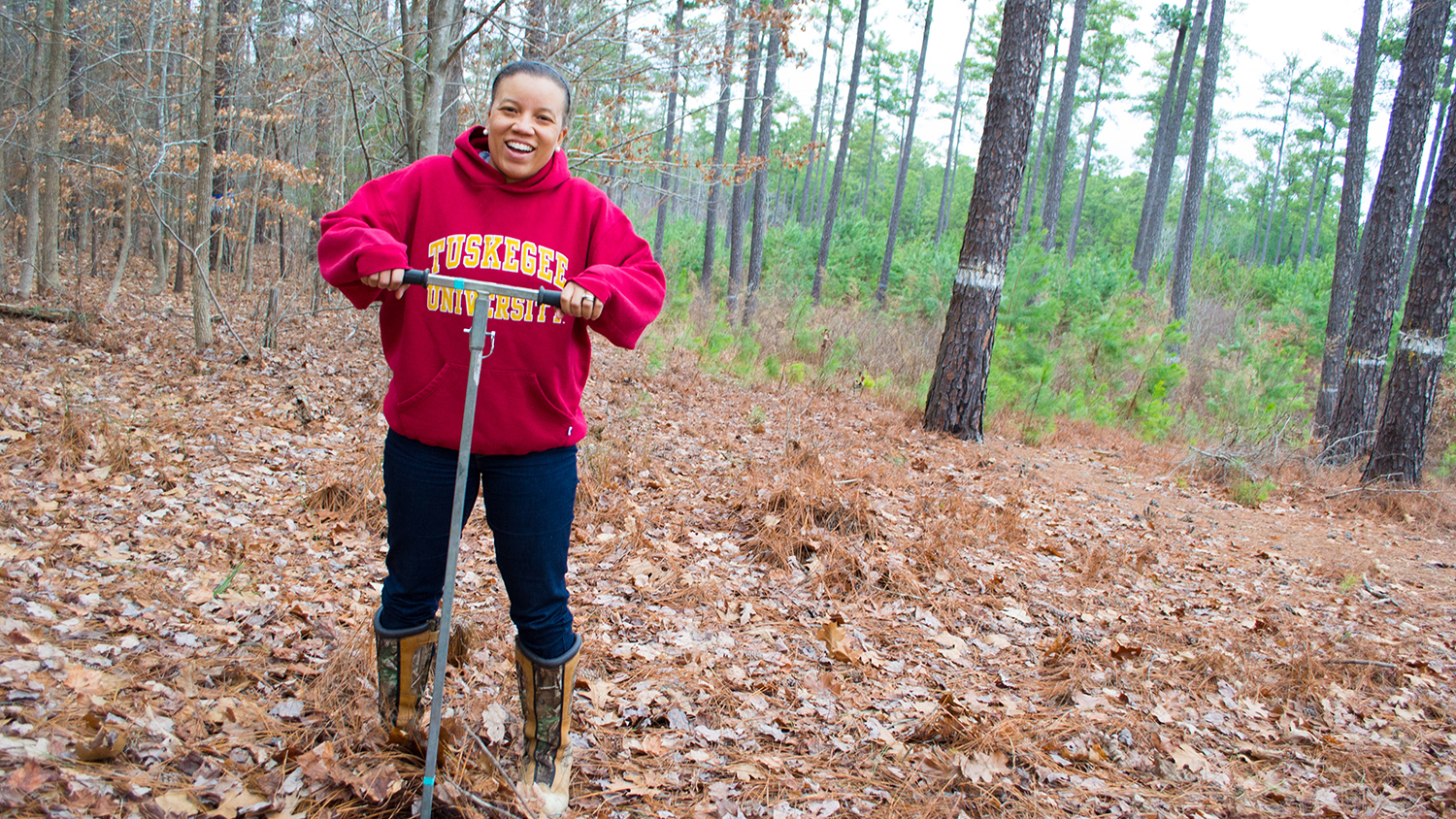NC State Forestry Professor Named to Ecological Society of America’s Diversity Task Force

A professor at NC State’s College of Natural Resource is working to improve diversity and inclusion at one of the largest environmental organizations in the United States.
Zakiya Leggett, an assistant professor in the Department of Forestry and Environmental Resources, has been named an inaugural member of the Ecological Society of America’s Diversity, Equity, Inclusion and Justice (DEIJ) Task Force.
Based in Washington, D.C., the Ecological Society of America (ESA) is a professional organization of more than 9,000 researchers, educators, natural resource managers and students around the world. The organization established the six-member DEIJ Task Force earlier this year to address barriers, injustices and structural inequities impacting members of the organization’s Black, Indigenous and People of Color (BIPOC) community.
“ESA stands firm in its commitment to challenge and break down inequities in our community of scientists and practitioners of ecology,” the organization said in a press release. “Structural change happens when existing systems and ideas are challenged, new ideas are generated and we make active progress toward changing the system.”
Research shows that minorities compose only a small percentage of the millions of staff members and volunteers at environmental organizations and government agencies across the United States.
Although the ESA has come a long way toward embracing diversity and inclusion, the organization continues to struggle with recruiting and maintaining a diverse membership — and leadership, according to Leggett.
“We’ve had BIPOC members step away over the years due to a lack of representation,” Leggett. “I’ve seen it reflected in the board and at meetings. When people see that lack of representation, they feel like their voices aren’t being heard.”
The DEIJ Task Force will review real and perceived barriers to full participation by all ESA members, prioritize actions and propose metrics and a timeline for their implementation, and estimate the resources required to carry out the actions. It will initially focus on anti-racism.
As a member of the ESA for more than two decades, Leggett has first-hand experience with the organization’s diversity and inclusion challenges and initiatives.
During her time as a student at Tuskegee University in Alabama, Leggett participated in one of the first cohorts of the Strategies for Ecology Education, Diversity and Sustainability (SEEDS) program. The program’s mission is “to diversify and advance the ecology profession through opportunities that stimulate and nurture the interest of underrepresented students to participate, and to lead in ecology.”
Leggett has remained active in the SEEDS program as a mentor and member of the advisory board. She was named the recipient of the ESA’s “Commitment to Human Diversity in Ecology Award” in 2018 for her efforts to mentor and recruit students from the BIPOC community.
In addition to her role in the SEEDS program, Leggett also serves as a member of the ESA’s Black Ecologists Section. The section seeks to develop a safe space for its members to address the many challenges that Black ecologists face in academia.
Leggett and other members of the Black Ecologists Section recently published a paper in The Bulletin of the Ecological Society of America describing these challenges, and how the section is supporting people in the BIPOC community. That includes the retention and recruitment of students from underrepresented populations.
Students who earn forestry, wildlife and fisheries degrees typically enjoy a wide variety of careers in the public and private sector. Research suggest, however, that people of color are less likely to pursue a career in forestry and natural resources due to economic, cultural and discrimination-related barriers.
“One of the biggest problems that BIPOC students face in ecology is lack of representation,” Leggett said. “When they experience this lack of representation, it reinforces this misconception that career fields focused on the outdoors or in ecology aren’t for them.”
Leggett added that the DEIJ Task Force, Black Ecologists Section and similar initiatives can have a variety of benefits, including an increased sense of well-being among students and professionals alike.
Before joining the faculty at NC State in 2016, Leggett worked for 10 years as a sustainability scientist at the Weyerhaeuser Company, where she involved students from diverse backgrounds in her work designing and executing multidisciplinary research studies to address environmental sustainability for the global forest products company.
Today, Leggett serves as co-coordinator of an accelerated graduate degree program between NC State and Tuskegee University that aims to recruit and mentor students from underrepresented groups who are interested in pursuing forestry careers.
She also manages a variety of other programs aimed at expanding educational and professional opportunities for students from underrepresented minority groups in ecology and related fields. That includes the Doris Duke Conservation Scholars Program; the Scholars for Conservation Leadership Program; and the USDA National Needs Graduate and Postgraduate Fellowship Program.
Leggett continues this mentoring work as an invited speaker at schools, national conferences and universities, sharing her passion for environmental education and stewardship.
- Categories:


